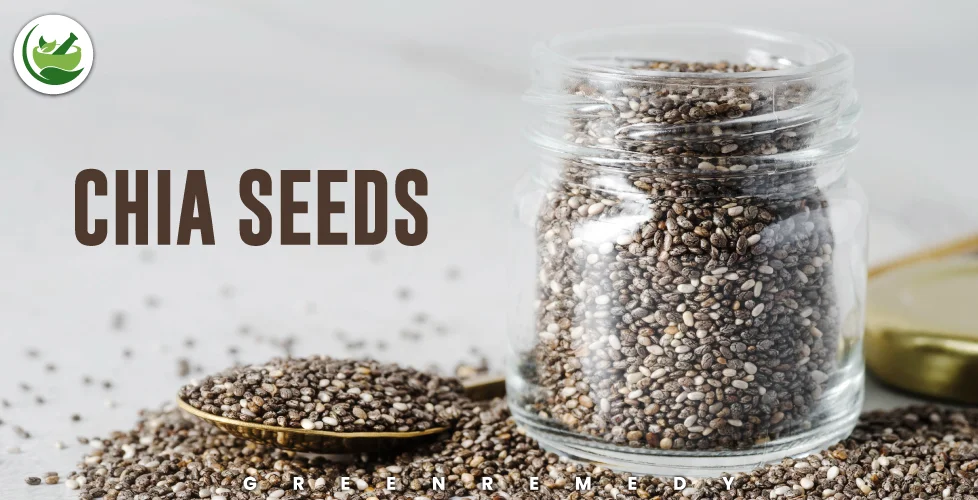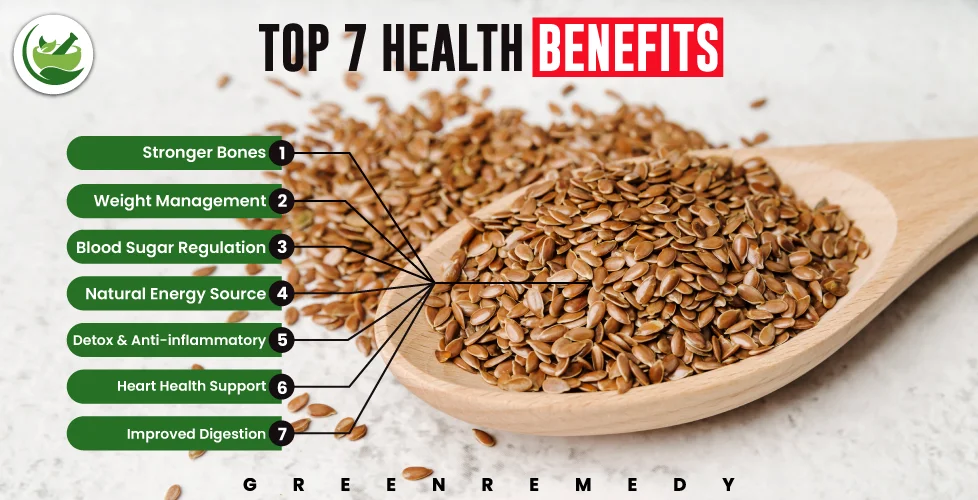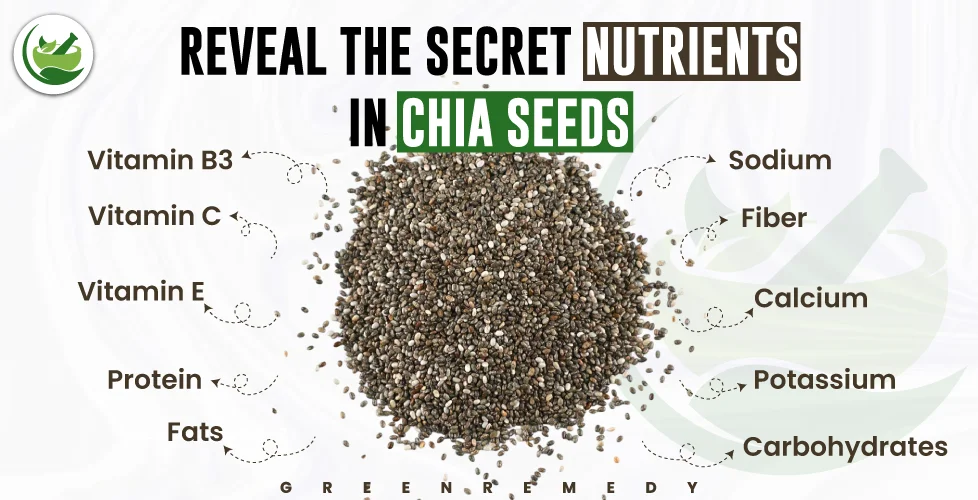
In the world of natural health and plant-based nutrition, few foods have earned the status of a superfood as convincingly as chia seeds. These tiny, versatile seeds may look simple, but they deliver powerful health benefits. At Green Remedy, we’re passionate about helping you discover the most nutrient-dense options nature has to offer—so today, we’re diving into the nutrient value of chia seeds.
Read more: How to Incorporate Ground Chia Seeds into Your Daily Diet
What Are Chia Seeds?
Chia seeds are harvested from Salvia hispanica, a desert plant native to Mexico and Guatemala. Used for centuries by ancient Aztec and Mayan civilizations, these seeds were prized for their ability to provide sustained energy and nutrition—a reputation that modern science now backs.
But what exactly makes chia seeds so valuable to your diet? The answer lies in the impressive nutrient value of chia seeds.
Nutritional Profile for a 28g Serving (2 Tablespoons)
Let’s start by looking at the hard facts. Here’s what you get from one serving:
| Nutrient | Amount | % Daily Value |
| Calories | 137 kcal | — |
| Protein | 4.4g | 9% |
| Fiber | 10g | 36% |
| Omega-3 (ALA) | 4.9g | — |
| Total Fat | 8.6g | 13% |
| Calcium | 179mg | 18% |
| Magnesium | 95mg | 24% |
| Iron | 2.2mg | 12% |
| Phosphorus | 244mg | 35% |
| Antioxidants | High | — |
This nutrient-rich profile makes chia seeds an ideal daily supplement, perfectly suited for almost any lifestyle.
Read more : Exploring the Health Benefits: Chia Seeds vs Basil Seeds
Chia Seeds 7 Amazing Benefits You Didn’t Know

Discover the top 7 health benefits that can boost your well-being and transform your daily lifestyle naturally.
1. Improved Digestion
The fiber content in chia seeds plays a key role in gut health by promoting regularity and nourishing beneficial bacteria, leading to improved overall digestion.
2. Heart Health Support
Chia seeds are packed with omega-3 fatty acids that help lower bad cholesterol, stabilize blood pressure, and support overall heart health as part of their powerful nutrient profile.
3. Stronger Bones
Packed with calcium, phosphorus, and magnesium, chia seeds support strong bones—making them an excellent choice, especially for those on a dairy-free diet.
4. Weight Management
The fiber and protein in chia seeds help increase satiety, keeping you full for longer and naturally supporting healthy weight management.
5. Blood Sugar Regulation
Chia seeds help slow the breakdown of carbohydrates, preventing insulin spikes—making them a smart choice for diabetics or anyone managing blood sugar levels.
6. Natural Energy Source
Used historically by warriors and runners, the nutrient value of chia seeds includes a steady release of energy making them a great option for athletes or long workdays.
7. Detox & Anti-inflammatory
Rich in antioxidants and naturally hydrophilic, chia seeds support cellular repair and help reduce inflammation throughout the body.
Read more : Benefits of Chia Seeds During Pregnancy
Chia vs. Other Super Seeds

| Seed Type | Fiber (g) | Omega-3 (g) | Protein (g) | Calcium (mg) |
| Chia | 10 | 4.9 | 4.4 | 179 |
| Flax | 8 | 6.4 | 5.1 | 74 |
| Hemp | 1 | 0.6 | 10 | 21 |
The chart clearly shows how the nutrient value of chia seeds surpasses that of many popular superfoods, especially in fiber and calcium.
Pros and Cons
Pros
- Rich in omega-3s, fiber, and protein
- Supports heart, bone, and gut health
- Easy to incorporate into meals
- Long shelf life and no prep needed
- Vegan, gluten-free, and allergy-friendly
Cons
- May cause bloating if not soaked properly
- Can interact with blood thinners
- Not a major source of vitamins like B12 or D
- Best used alongside a balanced diet
While the nutrient value of chia seeds is outstanding, moderation is key to avoiding digestive discomfort.
How to Use Chia Seeds Daily
You can enjoy chia seeds in a variety of easy, delicious ways:
- Chia pudding: Soak in milk overnight, sweeten with honey, add fruit.
- Smoothie boost: Add a tablespoon for protein and texture.
- Salad topping: Sprinkle raw for a crunch.
- Baking: Use in muffins, pancakes, or as a vegan egg (1 tbsp chia + 3 tbsp water).
- Chia water: Mix with lemon and mint for a detox drink.
Every method of preparation allows you to fully benefit from the powerful health properties of chia seeds.
Who Can Benefit from Chia Seeds?
The beauty of chia seeds lies in their wide-ranging benefits that make them appealing to almost everyone.
- Ideal for weight loss programs
- Perfect for plant-based and keto diets
- Safe for gluten intolerance
- Recommended for athletes and the elderly
- Suitable for daily health maintenance
Final Thoughts
Chia seeds may be small in size, but their health benefits are truly impressive. They support a range of vital systems in the body, including digestive health, heart function, bone strength, and more. Their natural blend of fiber, healthy fats, protein, and essential minerals makes them a powerful ally in any wellness routine.
We believe in clean, nourishing choices that support your well-being from the inside out. Add chia seeds to your routine and feel the natural difference.
Frequently Asked Questions (FAQs) About Chia Seeds
Q1. What is the nutritional value of chia seeds?
One serving (about 2.5 tablespoons) of dried chia seeds contains:
- 140 calories
- 5 grams of protein
- 10 grams of fiber
- 12 grams of carbohydrates
- 9 grams of fat (including 8 grams of heart-healthy omega-3 fats)
Chia seeds are also rich in calcium, magnesium, and antioxidants.
Q2. What is the nutritional value of 1 tablespoon of chia seeds?
One tablespoon of dried chia seeds provides approximately:
- 58 calories
- 2 grams of protein
- 2 grams of fiber
- 2 grams of omega-3 fatty acids
Macronutrient breakdown: 33% carbs, 54% fat, 13% protein.
Q3. Do chia seeds improve testosterone?
Yes. Some studies show that chia seed supplementation can lead to a significant increase in total testosterone levels, although it does not appear to alter gonadotropin hormones.
Q4. Which hormone does chia seeds increase?
Research suggests chia seeds may increase LH (Luteinizing Hormone) and progesterone. They also help reduce inflammation markers like TNF-α and repair cellular damage induced by high-fat diets.
Q5. Is chia seed good for sperm health?
Yes. Chia seeds are a great source of omega-3 fatty acids, which are essential for sperm health. They help improve sperm count, motility, and quality, supporting male fertility.
Q6. What happens if I eat chia seeds daily?
Eating chia seeds daily offers numerous health benefits including:
- Improved digestion
- Balanced blood sugar
- Heart health
- Satiety and weight control
However, overconsumption may lead to digestive issues like bloating, gas, constipation, or diarrhea due to high fiber.
Q7. How much chia seed is safe per day?
While there’s no official RDA, up to 50 grams (about 5 tablespoons) per day is considered safe for most people.
Just 2 tablespoons daily provide all key health benefits.
Q8. What is the best time of day to consume chia seeds for weight loss?
- Morning: Helps curb cravings and reduce appetite throughout the day
- Midday: Works as a healthy snack to prevent afternoon overeating
- Before Bed: Supports blood sugar balance and overnight digestion
Q9. How long should chia seeds be soaked?
Chia seeds begin absorbing water in just 5 minutes, but for best results:
- Soak for at least 15–20 minutes
- For chia pudding, soak overnight for a gel-like texture
Soaking enhances digestibility and nutrient absorption.
Q10. Who should avoid chia seeds?
Chia seeds are generally safe, but avoid or limit use if you:
- Have allergies to chia or related seeds
- Face swallowing issues (due to choking risk when dry)
- Take blood thinners or hypertension meds (interactions possible)
- Suffer from prostate cancer, kidney problems, or digestive conditions (consult your doctor)
Q11. What should you not mix with chia seeds?
Avoid combining chia seeds with the following, especially if soaked:
- Carbonated drinks
- Fried or high-fat foods
- Thick yogurts (may cause clumping)
- Sugary juices or drinks
- Large amounts of nuts or high-sodium foods
- Artificial sweeteners
- Heavy dairy products
These combinations can hinder digestion or nutrient absorption.






